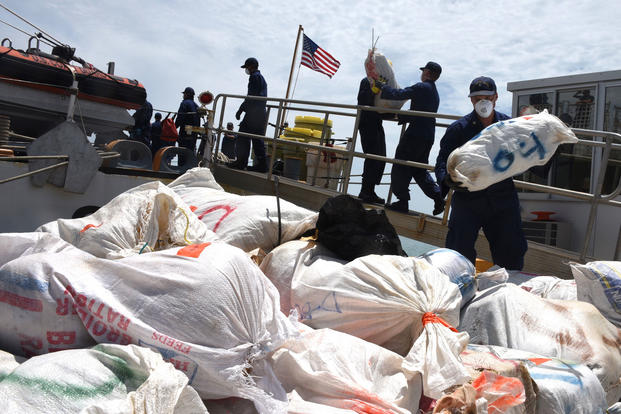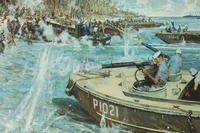The Coast Guard's 41,000 active-duty members will not be paid on their next payday, scheduled for Jan. 15, due to lack of appropriations in the ongoing government shutdown, the service's vice commandant said Thursday.
Active-duty Coast Guardsmen received a paycheck Dec. 28 as the result of a workaround by the Department of Homeland Security, Coast Guard, and Office of Management and Budget, which ruled that the service had the authority to issue all pay and allowances for December.
But in an all-hands message dated Jan. 10, Adm. Charles Ray said no reprieve will occur Jan. 15: The service is unable to cover its payroll.
"Unfortunately, without an appropriation, a continuing resolution or another legislative measure, the Coast Guard will not be able to meet the next payroll," Ray wrote. "Let me assure you your leadership continues to do everything possible, both internal and external to the service to ensure we can process your pay as soon as we receive an appropriation."
Ray said the Coast Guard Mutual Assistance Board has approved an increase in interest-free loans to junior employees and service members to help during the crisis. According to the memo, personnel E-5 and below, and GS-6 and below, are eligible for a loan up to a maximum of $1,000 for those with dependents and $750 for those without dependents.
Personnel in other paygrades may qualify for a loan as well, depending on their financial circumstances.
"Please know that your entire senior leadership team is pursuing every possible avenue to mitigate the effects that this unprecedented event is having on you and your families," Ray wrote.
While Coast Guard uniformed members were paid through December, the shutdown's effects were felt immediately by Coast Guard civilian employees, who were last paid Dec. 22. Of the 8,500 civilians who work for the service, 6,400 are on furlough and 2,100 are working without pay.
The Coast Guard lies within the Department of Homeland Security, which is among the agencies affected by the shutdown. The closure is impacting operations at nine departments and agencies, including Homeland Security, Justice, State, Treasury, Interior, Commerce, Agriculture, the Environmental Protection Agency and NASA.
Appropriations were passed last year for the Defense and Veterans Affairs Departments, which remain unaffected.
In a message to the Coast Guard fleet on Wednesday, Commandant Adm. Karl Schultz expressed his pride in the members and employees for continuing to serve, answering "a higher calling to protect America."
"We remain a ready, relevant and responsive Coast Guard. Thank you!" Schultz wrote.
He also noted that the situation demands that leaders be on their best footing. "I call on you to be intrusive leaders at your respective units, demonstrating empathy, conveying key information and identifying and ensuring our most vulnerable shipmates get the assistance they need."
Bills were introduced earlier this week in both the House and Senate to ensure that Coast Guard members get paid, but whether the legislation, dubbed the "Pay Our Coast Guard Act," can be approved before Tuesday is doubtful.
Speaking on NPR on Tuesday, a former Coast Guard commandant, retired Adm. Thad Allen, called the situation "pretty, pretty bad."
"I think when you have people who are providing emergency services to this country without pay, I think we ought to take a serious look at how we're governed," he said. "[Coast Guardsmen] are doing their job. And they're dependent on the American public and the people that run this government to make sure they're paid on time."
A number of military and veterans organizations and companies that serve the military community are stepping in to help distressed families.
American Legion officials said Tuesday the organization would provide financial assistance to Coast Guard members with children who can't meet their living expenses.
USAA is offering low-interest direct deposit loans to its members who are active-duty Coast Guard. And Navy Federal Credit Union is offering a 0 percent loan up to $6K during the shutdown to federal government employees, as well as active-duty Coast Guard who are members.
In Alaska, the Armed Services YMCA extended access to its food pantry to families with base access, including Coast Guard members, civilian Defense Department contractors and retirees.
Roughly 300 Coast Guard families living in Lincoln Military Housing will get a reprieve to pay their rent when they finally are paid, without penalty, according to a Lincoln Military Housing spokesman.
Other contractors running military housing did not respond to questions regarding their policies by press time.
In many communities, Coast Guard families are getting support from their neighbors.
In Boston, about 400 Coast Guard families had visited a pop-up food pantry in the first two days it was open, according to a Maine Public Radio report.
At Langley Air Force Base, Virginia, where a handful of Coast Guard families live in base housing, Kelsey Pernsteiner, an Air Force veteran and spouse of an active-duty airman, is organizing a dinner for Jan. 15 -- the day the families are likely to miss their first paycheck.
"It's the least I could do to help them out," she said. "We are having trouble getting food donations for them, and they are under stress to pay their rent. It's outrageous."
-- Patricia Kime can be reached at patricia.kime@military.com. Follow her on Twitter @patriciakime.















